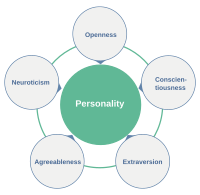
Photo from wikipedia
The COVID-19 pandemic has had a significant impact on mental health, leading to the increase of depressive symptoms. Identifying these symptoms and the factors associated with them in women and… Click to show full abstract
The COVID-19 pandemic has had a significant impact on mental health, leading to the increase of depressive symptoms. Identifying these symptoms and the factors associated with them in women and men will allow us to understand possible mechanisms of action and develop more specific interventions. An online survey was conducted from 1 May to 30 June 2020 using snowball sampling; the final sample comprised 4122 adult inhabitants of Mexico; 35% of the total sample displayed moderate-to-severe depressive symptoms, with a greater proportion of depression being among female respondents. A logistic regression analysis revealed that individuals under 30 years of age, those with high levels of stress due to social distancing, those with negative emotions, and those who reported a significant impact of the pandemic on their lives have a higher risk of depression. Women with a history of mental health treatment and men with a history of chronic disease were also more likely to experience depressive symptoms. Social environment and sex are factors that intervene in the development of depressive symptoms, meaning that appropriate early identification and intervention models should be designed for the care of men and women in highly disruptive situations such as the recent pandemic.
Journal Title: International Journal of Environmental Research and Public Health
Year Published: 2023
Link to full text (if available)
Share on Social Media: Sign Up to like & get
recommendations!